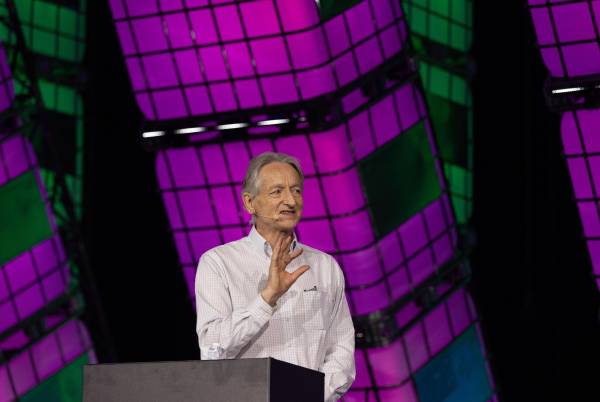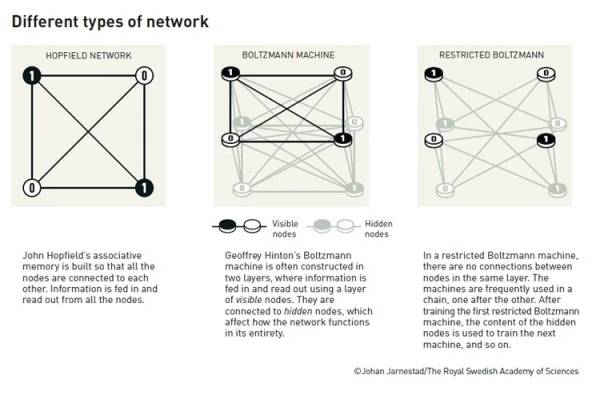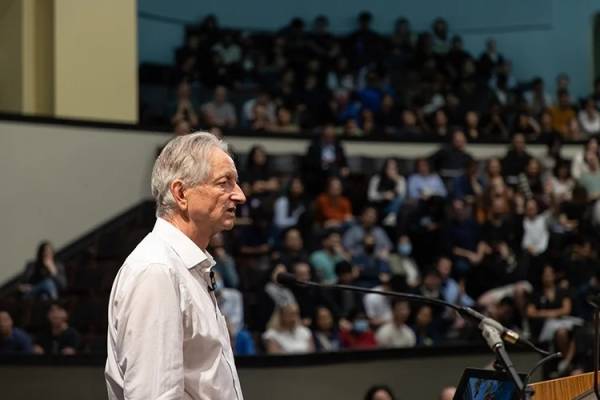UC Emeritus Professor Geoffrey Hinton wins Nobel Prize in Physics

Geoffrey Hinton, a University Professor Emeritus of computer science at the University of Toronto and University College, has won the 2024 Nobel Prize in Physics.
Widely regarded as the “godfather of AI,” Hinton shared the prize with John J. Hopfield of Princeton University for foundational discoveries and inventions that enable machine learning with artificial neural networks.
Hinton said he was “flabbergasted” at the honour.
“I had no expectations of this,” he told U of T News shortly after the win was announced in Stockholm Tuesday morning. “I am extremely surprised and I'm honoured to be included.”
He later told reporters at a press conference he was “in a cheap hotel in California” with no Internet and a poor phone connection when he was notified about his Nobel Prize.
“I was going to get an MRI scan today, but I think I’m going to have to cancel that.”
Hinton and Hopfield are credited with wielding tools from physics to advance basic research in the field. Specifically, Hopfield created an associative memory that can store and reconstruct images in data, while Hinton invented a way to find properties in data and perform tasks such as identifying specific elements in pictures.
“On behalf of the University of Toronto, I am absolutely delighted to congratulate University Professor Emeritus Geoffrey Hinton on receiving the 2024 Nobel Prize in Physics,” said U of T President and Goldring Chair in Canadian Studies at University College, Meric Gertler. “The U of T community is immensely proud of his historic accomplishment.”
Hinton was selected for the high-profile award for his use of the Hopfield network – invented by his co-laureate – as the foundation for a new network called the Boltzmann machine that can learn to recognize elements within a given type of data.
The Boltzmann machine can classify images and generate new examples of the pattern on which it was trained, with Hinton and his graduate students later building on this work to help usher in today’s rapid development of machine learning – a technology that now underpins a host of applications ranging from large language models such as ChatGPT to self-driving cars.

“The laureates’ work has already been of the greatest benefit. In physics we use artificial neural networks in a vast range of areas, such as developing new materials with specific properties,” said Ellen Moons, chair of the Nobel Committee for Physics.
Hinton joined U of T as a professor of computer science in 1987 after working in various universities in the U.K., where he was born, and in the United States. He went on to be named a University Professor – U of T’s highest academic appointment – in 2006.
In the years following his arrival in Toronto, Hinton and his graduate students built on his early efforts with an array of developments that paved the way for an explosion in deep learning. One of the first cohort of researchers supported by the Canadian Institute for Advanced Research (CIFAR), Hinton’s work helped catapult Canada to its current status as a global leader in AI development.
In a virtual press conference with the Royal Swedish Academy of Sciences on Tuesday morning, Hinton likened the influence of AI to that of the Industrial Revolution – “But instead of exceeding people in physical strength, it’s going to exceed people in intellectual ability,” he said.
He noted the rise of AI “is going to be wonderful in many respects,” citing health care and workplace productivity as two areas poised to benefit hugely from the technology. “But we also have to worry about a number of possible bad consequences, particularly the threat of these things getting out of control,” Hinton said, reiterating concerns that he has voiced numerous times in recent years.
In early 2023, Hinton quit his job at Google and focused on sounding the alarm about the risks of rapid and unfettered AI development, outlining his reasoning in a U of T video, released May 2023, titled The Godfather in Conversation.
Since then, he has tackled the issue at lectures and public appearances around the world, including at his alma mater Cambridge University and at a November 2023 event for U of T students and faculty at the university’s Convocation Hall.
“I am thrilled Geoffrey Hinton, an esteemed colleague and dear friend has been awarded the Nobel Prize in Physics,” said Melanie Woodin, dean of U of T’s Faculty of Arts & Science.
“Geoff is an historic visionary whose groundbreaking work in deep learning and neural networks has made U of T and the Toronto region a leading global centre for AI. And it speaks volumes about his integrity that while he helped lay the foundation for the artificial intelligence revolution, he is also one of the leading voices urging that we develop this technology responsibly and ethically.”

Hinton, who is also chief scientific adviser at the Vector Institute in Toronto, adds the Nobel Prize to a long list of accolades, which includes the Association for Computing Machinery’s A.M. Turing Award in 2019 – widely considered “the Nobel Prize of computing” – alongside collaborators Yann LeCun and Yoshua Bengio.
Hinton is the fourth U of T faculty member to win a Nobel Prize over the years.
Sir Frederick Banting and J.J.R Macleod won a Nobel Prize in Physiology or Medicine for their work with Charles Best in 1923 to isolate insulin. In 1986, John Polanyi was one of three winners of the Nobel Prize in Chemistry for the development of the new field of reaction dynamics.